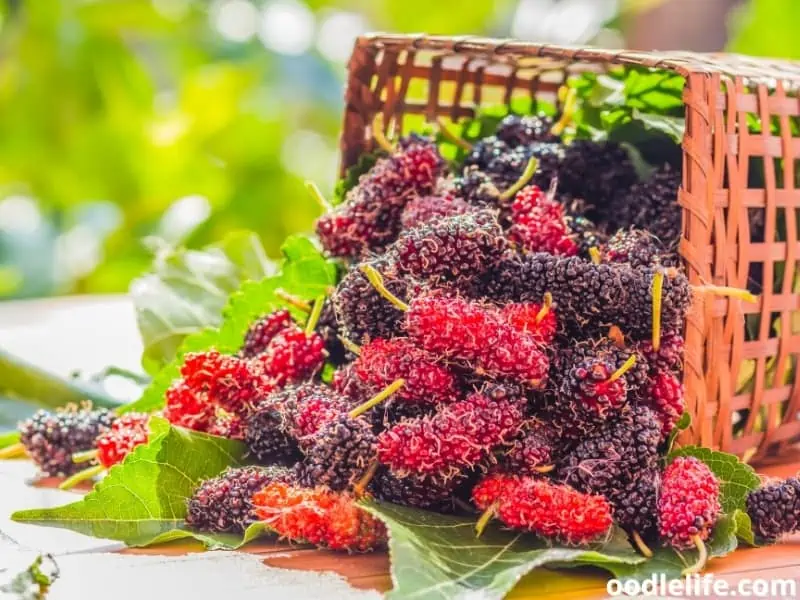Can Dogs Eat Mulberries? Not Your Typical Dog Food
Are mulberries poisonous to dogs?
What can a seemingly harmless berry do to your fur babies, right? While there is NOTHING about toxic mulberries, you should still take preventive measures.

Don’t worry; we’ll answer ALL of your questions in this article.
Woof got your back!
The Fruity Question: Are Mulberries Safe for Dogs?
Alternatively, can dogs eat mulberries?
If you happen to have a few mulberries at home, FEEL FREE to feed them to your furry friend.
Mulberries ARE safe for dogs — they’ll even enjoy munching on those ripe mulberries!
However, make sure to let dogs consume mulberries in moderation.
Feeding them TOO MANY MULBERRIES may result in upset stomachs (and a messy dog poop clean up).

What Are Mulberries?
Mulberries are blackberry-type fruits that grow out of a mulberry tree.
More importantly, they are NATIVE TO CHINA but can also be found in some parts of North America.
Now compared to blackberries, you’ll notice that mulberries are:
- More oval in shape
- More elongated in length
To make this distinction better, there are THREE MAIN TYPES OF MULBERRIES that you should know about.
So can dogs eat mulberries SAFELY? Yes, so long as you are extremely careful with it and know the different mulberries types!

Learn more about them here:
1. White Mulberries (Morus alba)
Can dogs eat white mulberries? Yes.
First brought to the US to feed SILKWORMS, white mulberries help your dogs develop a healthy skeletal structure.
This makes them SAFE for dogs to eat while being consumed in moderation.
You can physically expect the white mulberry tree to produce white or slightly green berries.
2. Black Mulberries (Morus nigra)
Can dogs eat black mulberries? Yes.
These TWO PHYSICAL CHARACTERISTICS easily distinguish black mulberries:
- Earthy yet sweet taste
- Wine-colored stains
But more than these, black mulberries are also popularly used for MEDICINAL PURPOSES.
You can thus expect an improved, and healthier metabolism among your furry buddies once consumed.
3. Red Mulberries (Morus rubra)
Can dogs consume red mulberries? Yes.
While boasting no extraordinary features, the red mulberry is the most abundant genus among the mulberry trees.
You will most likely find these in the market when debating whether or not to feed them to your pups.
Regardless, you can expect the same health benefits from the red mulberry.
4. Mulberry Leaves
While not necessarily a VARIETY of the fruit, seeing your dogs eat mulberry leaves is still possible.
The question is: Should they? Are mulberry leaves toxic to dogs?
Well, mulberry leaves are NOT toxic to your dogs. On the contrary, they offer MEDICINAL PROPERTIES when consumed in moderation.
The case stands that having too much can lead to an upset stomach.
Mulberries for Dogs: A Healthy Diet
We all want the BEST for our dog’s health, right?
To fully understand why dogs can eat Mulberries, let’s take a closer look at this natural fruit.

Nutritional Facts About Mulberry
Occasionally giving your dogs mulberries is not only safe but is also good for their health.
Eating one cup (140 g) of fresh mulberries alone gives them the much-needed 60 kcal of energy.
A breakdown of its NUTRITIONAL PROFILE is as follows:
- 88% Water
- 9% Carbohydrates
- 1.7% Fiber
- 1.4% Protein
- 0.4% Fat
You can expect dried mulberries to have LESS WATER CONTENT.
This will yield higher and more concentrated amounts of nutrients following this profile instead:
- 70% Carbohydrates
- 14% Fiber
- 12% Protein
- 3% Fat
Eating mulberries may not be as nutritious as compared to OTHER FRUITS.
However, the added nutritional value when your dog eats mulberries is already enough to get by a day’s exercise.
Health Benefits of Mulberries to Dogs
The nutrients and chemical substances translate to improvements that pet owners can easily quantify and observe.
That said, it’s only RESPONSIBLE for us to dig deeper into how these nutrients benefit your pups.
Here are the 6 ADVANTAGES YOU GAIN when your dogs munch on mulberries:
1. Better Blood Circulation
Mulberries have a significantly high amount of iron compared to all other edible fruits.
This is GREAT NEWS because dogs are recommended to have it in an 80 mg/kg dry weight ratio.
Having this much iron in your dog’s would mean:
- Enhanced production of red blood cells
- Improved transport of oxygen to the body
- Improved cardiovascular health
- Less muscle fatigue
The antioxidants and flavonoids in mulberries also help the circulatory function of blood vessels.
This resulting blood circulation results in a more energized dog WITH a lower risk of contracting diseases.

2. Stronger Immune System
There are two active components present in mulberries that help IMPROVE your dog’s weakened immune system:
- Alkaloids – stimulate the immune system for better alertness and reaction time
- Vitamin C – increase the number of antibodies to fight off bacteria, toxins, and viruses
These components are comparable with white blood cells to fight off various diseases.
Thus, a stronger immune system can increase your dog’s ENDURANCE and OVERALL STRENGTH.
3. Stronger and Healthier Bones
You’d be surprised by how packed those tiny mulberries are with nutritious elements PERFECT for bones:
- Calcium
- Iron
- Vitamin C
- Vitamin K
- Phosphorus
- Magnesium
A healthy diet containing these is important to maintain, especially for older dogs.
For your ACTIVE furry friends, healthy bones and strong bones are must-haves. This will help prevent irreversible bone damage sustained from rough physical activities.

4. Slower Aging Process
In relation to health, mulberries also contain natural antioxidants that help NOURISH your dog’s physically active body.
The polyphenol resveratrol and antioxidant anthocyanin present in mulberries are responsible for such youthful mechanism:
- Protection from oxidative due to free radicals
- Canine longevity
- Reduced risks of cancer and heart disease
The right amount of mulberries can thus help give your dogs MORE energy.
This helps fight off muscle fatigue more observable in aging dogs — much more when they are actively engaging in physical activities.
5. Better Digestive Health
Mulberries contain a good amount of soluble and insoluble fibers.
If your dogs are having difficulty eating and secreting, you should consider introducing mulberries to their diet.
This is because fiber is a GREAT asset to aid in smoother digestion:
- Helps bulk up stool
- Improves bowel movement
- Facilitates easier secretion
The resulting benefits to your dog’s gut are necessary to maintain its natural digestive schedule. Issues that are otherwise observed in fiber-deficient dogs include the following:
- Stomach cramps
- Flatulence
- Constipation
- Abnormal secretion coloring
REMEMBER: Having TOO MANY MULBERRIES can result in an upset stomach.
This is why you should ALWAYS feed them mulberries moderately. Regardless, mulberries help manage your dog’s digestion.

6. Enhanced Brain Health
Have you considered how your dog’s diet affects their TRAINING? Mulberries can also help you with that!
They achieve these in TWO WAYS:
- Facilitating the repair of your dog’s brain cells
- Improving your dog’s cognitive functions
Improved brain health can thus help your dogs perform COMPLEX TASKS easier.
This makes mulberries perfect treats and accompaniments when you bring your dog out for training exercise.
The Do’s and Don’ts of a Dog’s Mulberry Diet
Let’s admit it: mulberries aren’t your common berries. There’s quite a lot to unpack, especially if you’re a NEW pet owner.
Here are a few tips that you should keep in mind when feeding your dogs with mulberries!
Observe Your Dog
You will never know how your fur baby will REACT when you serve mulberry. This is why you might want to CAREFULLY OBSERVE them at first.
Keep an eye on these possibilities:
- Allergic reaction
- Upset stomachs
Ripe mulberries or in their unripe form, it will ALWAYS be best to observe them the first time.
Bring them to your nearest vet the moment you see any unwanted reactions.

Don’t Overfeed Them With Mulberries
Are mulberries bad for your dogs? No, not at all!
But remember: having TOO MUCH of them can be more detrimental to your furry friend’s health. You might want to LIMIT their access to mulberries in the first place.
That said, here are the 4 do’s of the mulberry diet:
- DO pick up the mulberry fruits off the ground — that is, if you have a mulberry tree at home
- DO regularly sweep your yard to get rid of fermented mulberries on the ground
- DO be aware of your path when out on a walk with your dog
- DO train your dog to only eat food that you feed them
These precautionary measures are necessary because mulberries are ABUNDANT in North America. You might want to look around your greeneries to make sure you have them around you.

Don’t Bake Mulberries Into Treats
Are mulberries safe as doggie treats? Yes, absolutely.
But baking mulberries into treats DRIES THEM UP.
So can dogs eat dried mulberries, then? Well, only in FEWER amounts.
Here’s why:
- The process strips off most of the mulberry’s nutritional content
- Dried mulberries contain significantly FEWER amounts of water than fresh mulberries
- They result in too much sugar
This is just generally unhealthier than the natural fruit.
Additionally, baking the fruit makes it easier to consume, leading to your dogs overeating mulberries.
Don’t Feed Them With Unripe Mulberries
Simply put, unripe mulberries often cause stomach upset.
And on top of the digestive problems it might lead to, fermented mulberries can also make your dog dizzy feel lightheaded.
Responsible fur parents should want NOTHING but the best for an active and healthier pet.

Berries for Dogs: An Alternative Diet
There is a WIDE variety of berries to choose from, even for human consumption.
But ripe berries or not, NOT ALL BERRIES are suitable for animals.
Some are considered to be toxic berries for your fur babies:
- Cherries
- Juniper berries
- Baneberries
- Holly berries
- Mistletoe berries
Unlike these other berries, it’s still safer to feed your dog mulberries.
Some more berries that you can let your dogs consume include the following:
- Strawberries
- Blueberries
- Raspberries
These choices are suitable for their red blood cells and overall health.
Regardless, you need to do your research — be a responsible fur parent.

Feed Your Dog Mulberries Now!
If you’re still asking the question can dogs eat mulberries, then we’ll give you the straight answer.
Yes, be it a ripe or unripe mulberry. In fact, you can even give them some right now!
Just remember to do your job as a fur parent:
- Observe their reactions to the mulberry
- Feed them in moderation, and
- Always be by their side
Mulberries are overall beneficial to the health of your dogs. But keep in mind that having it in excess can otherwise give you unwanted results.
Have any questions left to ask? Want some more tips on how to use mulberries for training?
Shoot us an email!